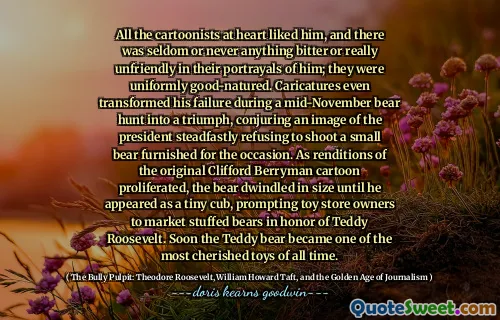"The Bully Pulpit" focuses on the relationship between Theodore Roosevelt and William Howard Taft, two significant presidents of the United States during the early 20th century. Author Doris Kearns Goodwin explores how both men navigated the political landscape, highlighting their shared commitment to progressive reforms, which aimed to address social issues and economic inequality. The narrative delves into their differing personalities and political ideologies, illustrating how these factors influenced their time in office and their legacies.
The book also emphasizes the role of journalism during this period, showcasing how the rise of investigative reporting helped to shape public opinion and hold politicians accountable. The era was marked by the emergence of influential journalists who used their platforms to expose corruption and advocate for change. Goodwin illustrates the symbiotic relationship between the presidencies of Roosevelt and Taft and the media, which she describes as a "bully pulpit" that allowed leaders to communicate directly with the American people.
Ultimately, "The Bully Pulpit" provides a rich historical context that examines the complexities of leadership and governance. It highlights the challenges faced by the two presidents and their attempts to create a more equitable society amid rising industrialization and social upheaval. Goodwin's work reflects on the lasting impact of their tenure and the importance of an engaged and responsible press in American democracy.
More »
Today Birthdays
1955 -
Max Lucado
1946 -
John Piper
1842 -
William James
1907 -
Abraham Joshua Heschel
1887 -
Aldo Leopold
1755 -
Alexander Hamilton
1976 -
Alethea Kontis
1971 -
Mary J. Blige
1825 -
Bayard Taylor
1943 -
Jim Hightower
1885 -
Alice Paul
1923 -
Carroll Shelby
1928 -
David L. Wolper
1954 -
Kailash Satyarthi
1972 -
Amanda Peet
1946 -
Naomi Judd
1970 -
Malcolm D. Lee
1955 -
Christian Marclay
1973 -
Rahul Dravid
1987 -
Jamie Vardy
1942 -
Clarence Clemons
1992 -
Fatima Sana Shaikh
1948 -
Larry Harvey
1930 -
Rod Taylor
